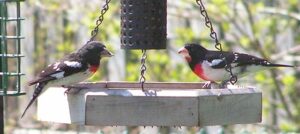If you’ve kept your bird feeders out this spring and live in the Midwest, Eastern, or South Eastern United States, you’re likely to enjoy a visit from Rose-Breasted Grosbeak over the next few weeks. From the end of April until mid-May, these stunning members of the cardinal family will be migrating back to their breeding grounds in the Northern United States and Canada.
Identifying a Rose-Breasted Grosbeak
 The Rose-breasted Grosbeak is a mid-sized bird that enjoys insects and black oil sunflower seeds. You can’t miss one of the males at your bird feeder. They will have vibrant reddish chest feathers (hence the name rose-breasted). When set against a mostly white chest and a black head and back, the rose-colored feathers stand out in such a striking way, that they are a delight to behold. The song of the male is described as a “sweet, rambling song” and is similar to a more distinct version of the American Robin’s song.
The Rose-breasted Grosbeak is a mid-sized bird that enjoys insects and black oil sunflower seeds. You can’t miss one of the males at your bird feeder. They will have vibrant reddish chest feathers (hence the name rose-breasted). When set against a mostly white chest and a black head and back, the rose-colored feathers stand out in such a striking way, that they are a delight to behold. The song of the male is described as a “sweet, rambling song” and is similar to a more distinct version of the American Robin’s song.
The female grosbeaks are less vibrantly colored, but still enchanting birds. Look for slate grey and brown upper parts and dark browns and black on the wings and tail. Both the males and females have large patches of pure white feathers on the undersides of their wing and tail feathers.
Fleeting feathers
For most of us, these striking fellows won’t be around for long. Enjoy them while you can. However, you’re likely to see more slightly exotic wild birds as the spring finally hits us with full force, after the seemingly never-ending winter most of the U.S. experienced this year. Blue grosbeaks will be coming through too, as well as Orioles and tanagers.
Mid-morning feeder watch
Watch your bird feeder mid-morning to catch a peek at migrating birds. Unlike early-rising locals, birds that are just passing through will rise and visit feeders later in the morning. This happens because they are exhausted by long flights northward, heading back towards their mating grounds.
Keep your feeder ready
To make sure migrating birds stop by your feeder, keep a tray or platform feeder clean and stocked with black oil sunflower seed throughout the migration season (April to late May for most species).

